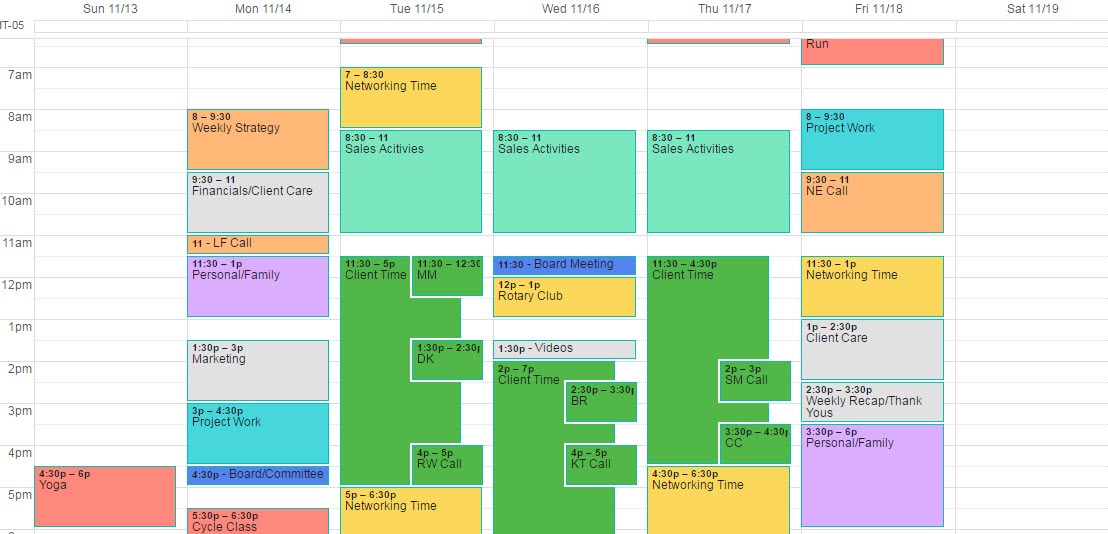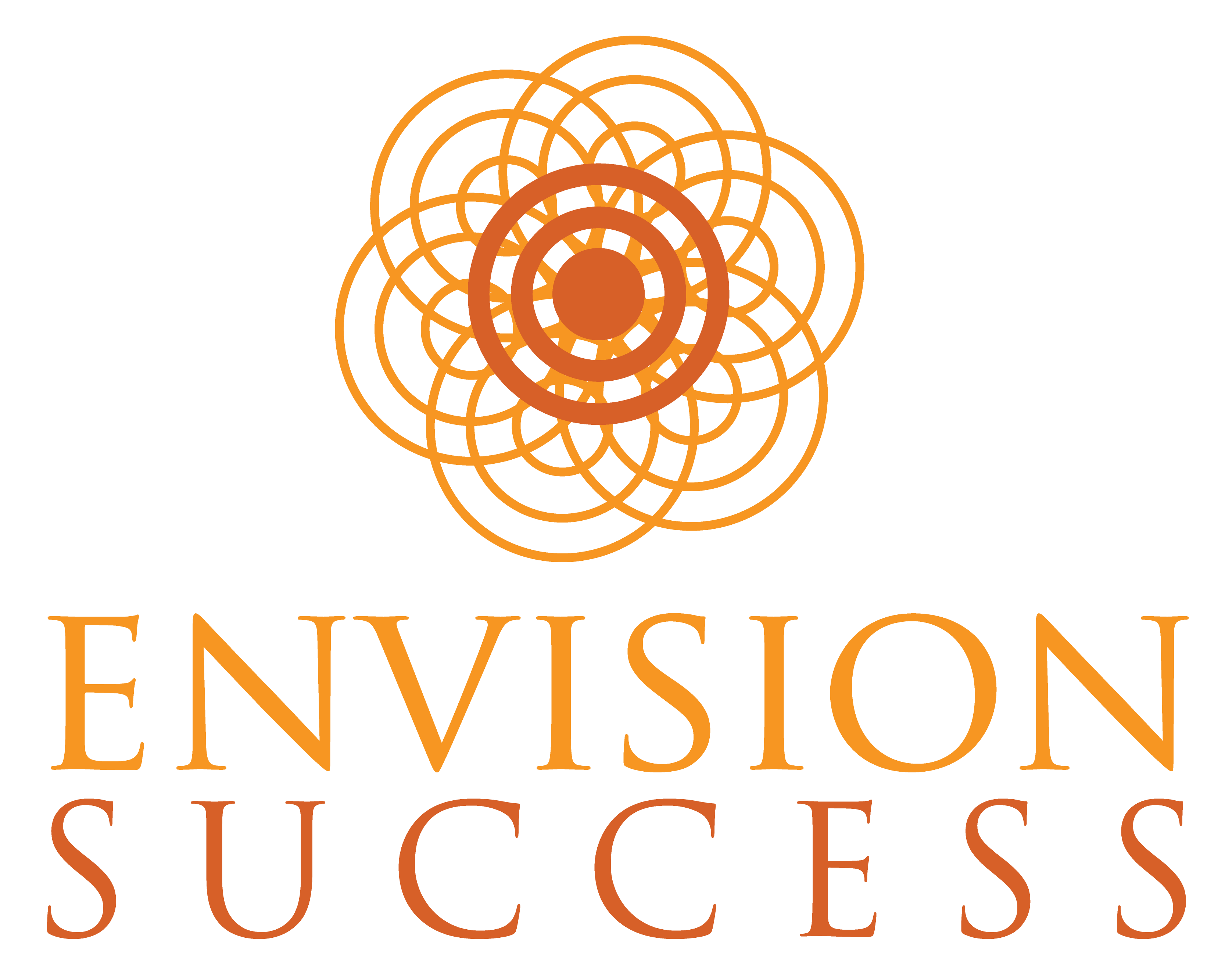Are you living the lifestyle you want? What does your calendar say about your life?

Power Up Your Calendar to Avoid Burnout and Get More Out of Life
If you've ever felt over-scheduled, ineffective, or worn out, you're not alone. Practically everyone will experience this at times during their working years. Yet, if you experience it for extended periods or allow it to be your normal mode, chances are good you'll be at risk for burnout. If you have fallen for the dangerous belief that being busy means a person must be important or needed, you're probably doing redundant and unnecessary work.
Why give up your life to stuff that doesn't need doing?
Ugh, this is a problem I see far too often in business. It's as if people are silently screaming, "I'm practically drowning in work and sacrificing my life to this job, so I should be appreciated for my proven commitment."
Please, let me shine some light on why this is counterproductive behavior:
If you hired a kid to mow your lawn and he looked like he could barely get the job done because he was working so hard, and rushing around, having to re-mow parts of the lawn, and taking extra time because he seemed distracted or taking calls from other clients while mowing your yard...you would wonder if you should start looking for someone else, right?
On the flip side, if he (or she) showed up consistently with well-maintained equipment, started and finished the job without distraction or rework, and once in awhile checked in with a relevant question or gave a helpful suggestion, you would be thrilled as long as your lawn looked decent, right?
Can you see the parallel with "too busy" behavior in other work settings?
If you hired a kid to mow your lawn and he looked like he could barely get the job done because he was working so hard, and rushing around, having to re-mow parts of the lawn, and taking extra time because he seemed distracted or taking calls from other clients while mowing your yard...you would wonder if you should start looking for someone else, right? He seems too busy and ineffective to be reliable...
(Are you pickin' up what I'm puttin' down?)
How are you going to leave a powerful, positive legacy if you are exhausted?
If your daily routine/typical schedule doesn't feel like it is supporting your best self, it's time to make some changes. If you have (or someone you care about has) become stuck in this mode of being too busy and ineffective, what can you do about it?
In this post, I share a game-changer exercise I've used with clients since 2006 to help them be at their best, get done what matters, and enjoy life! If you stick with me, you're going to craft an Ideal Calendar (aka a "perfect week") to aspire to, as a part of creating your intentional lifestyle. You can create the life you want. You can adjust what your calendar says about your life.
First, although it's common to feel too busy and like you can't get to all the things you want to do, you can DECIDE it doesn't have to be *your* normal. Make a commitment to yourself for the next month to make some improvements.
Can you make yourself a priority for a little while to support your desired lifestyle? Gimme a "YES!"
Take a look at your calendar.
It doesn't matter if it's digital or paper, but I strongly recommend that everything goes into ONE master calendar so you have a clear picture of where your time is going.
If you haven't been using your calendar for the majority of activities in your life, I recommend you start scheduling them. If you need to take a couple weeks to get this basic structure in place, that's fine.
Once you have one master calendar in use, you can move on to the 3 step process below to start living your desired lifestyle NOW and not wait for the magic "someday" that never comes.
STEP 1.
Take a look at your life according to your calendar; decide what should be added in, and what should be removed.
Consider which different activities, tasks, events, and routines are needed to best support your happiness and success, for both professional and personal.
Make a list of what you want.
Ask yourself, "What SHOULD go on my calendar?" Where do you add the most value professionally? Make sure time is scheduled for those activities. Which activities support these and other important areas? When is the best time to add them in, or move them to? In addition to work tasks, include things like exercise, writing, planning, reading, eating healthy lunches/meal prep, being home early some evenings, spending time with family or friends, volunteering, etc.
Adding stuff in means something has to go.
What can you stop doing? What can you delegate? Where can you make changes to so it takes less time? Can you initiate a plan to remove some items, or share the load with others? (Even if your initial response is "No, I can't. I have to do it all." I want you to seriously reconsider if that's true or if you've been fooling yourself. What if you needed major surgery or won a 3 week trip to Tahiti? You'd figure out what was truly important and what is not!)
STEP 2.
Look for opportunities to harness your existing habits and schedule to better support your desired lifestyle and success.
Specifically, I recommend creating routines to get important tasks completed and not leave things to chance.
Consider which activities or tasks are top priority (both professional and personal).
Also consider which factors will affect your ability to be successful, such as: When do you feel at your peak mentally or physically during the week, or during the day? How often should certain tasks be performed? How long do you need? Where will the task take place? Who else needs to be involved and when are they available?
Set-up routines for things which will be done regularly during a block of time.
Each of these can be put in your calendar as a recurring appointment (which could be moved if needed). If you have a goal to eat at home 2 nights a week, perhaps "Dinner with family" may be 2 hours to cook and eat together, and it's a recurring routine (or time block) on Mondays and Thursdays. Some weeks, you might move this block to another night as plans change, but generally the planned routine should work most of the time. Or at work, 1-to-1s with different members of your team might be scheduled during a weekly block set up for this, such as "Team check-ins" on Monday afternoons from 1:30-4pm. Then your actual meetings will slot into this time block as often as possible. It will take some trial and error and adjustment to get this right for the long-haul, but try your best to set it up so that it will work the majority of the time.
Some examples...
One of my favorite supportive routines that can be a calendar time block is my morning and evening "bookends" to each day. For example, I have a 90-minute collection of activities that I do every weekday morning, so that I don't leave things to chance later in the day (which frankly means it gets skipped way too often). For me, this includes exercise, meditation, coffee, shower, and be dressed and ready to work.
Another example is using time blocks during certain days/times every week to keep on track with your priorities, such as weekly planning on Friday afternoons (30 minutes of week's wrap-up), and Monday morning (60 minutes reviewing bigger goals, schedule, and strategizing when things are most likely to get done and making sure it's all in the calendar - including cushion time around some appointments to avoid rushing, lack of preparation prior, or lack of processing after).
How are you going to leave a powerful, positive legacy if you are exhausted? First, consider what should go on your calendar. Then, adjust your calendar to create the life you want...
STEP 3.
Create a draft of your ideal schedule, and start using it with your actual calendar now.
I recommend either a spreadsheet - or a piece of printer paper in landscape orientation, and a pencil - with overhead columns for days of the week, and rows for times of day. Start creating blocks of time for the activities/tasks you identified in steps 1 and 2 above.
Once your template looks pretty good, add in "placeholder" appointments for the routines and time blocks you want to include. Name them something useful to help yourself remember what type of activities to be engaged in during those times. I also color code my calendar so I can see at a glance what types of blocks I have coming up, but that's just personal preference.
Below is an example of my Ideal Calendar "template" a few years ago.

Tips for success and other considerations:
For some professionals, they create both a weekly ideal schedule and a monthly version.
Schedule recurring appointments for your support activities with reminders, just like critical meetings with people. For example, if you decide that sales meetings will be from 1-4pm weekdays, and your salon asks if 3pm works, you say 'No' and find another day/time.
You may feel over-scheduled at first, but keep in mind that leaving stuff to chance or memory rarely works well in today's modern world since we all have too much to do. You can always make changes as you go along to suit your personal style, but try scheduling everything that's important to you in the calendar and see how it goes.
Accept that you'll mess up sometimes, but that's OK.
"Progress over perfection" is the key here. Keep coming back to the vision you have of your desired lifestyle and acknowledge that by being intentional with your time and attention, you are creating it...
The hardest thing for most people is to stick with this when someone asks you for an appointment that conflicts with one of your support activities. It is OK to break your rules ONCE IN A WHILE, but for this to work, you need to treat all appointments like a meeting with a valued client.
Say, "I have something scheduled during that time. How about X or Y instead?"
When you give them options, it will work out just fine. If you decide to move something, make sure you commit to keeping the appointment in the new time. For example, you have monthly review & planning Monday at 10am and something else comes up you can't miss. Moving your planning meeting is fine; just make sure you don't skip it altogether. Skipping stuff leads to everything falling apart. Don't do it!
You will feel so much better consistently once you get your ideal schedule tweaked and have had a couple months with it in place!
This is seriously a GAME-CHANGER and so worth the effort to get it all set up and sticking with it. Before you know it, it will feel easy to check your calendar before committing to anything, and best of all you'll appreciate how powerfully it supports your desired lifestyle. You'll feel more calm and effective with a sense of relaxed control, and based on my own experience and many, many clients - you'll have all this AND be getting more done and doing MORE of the things you want to do.
Share with me your thoughts and results from this post! Post in the blog comments below or tag me on social.
